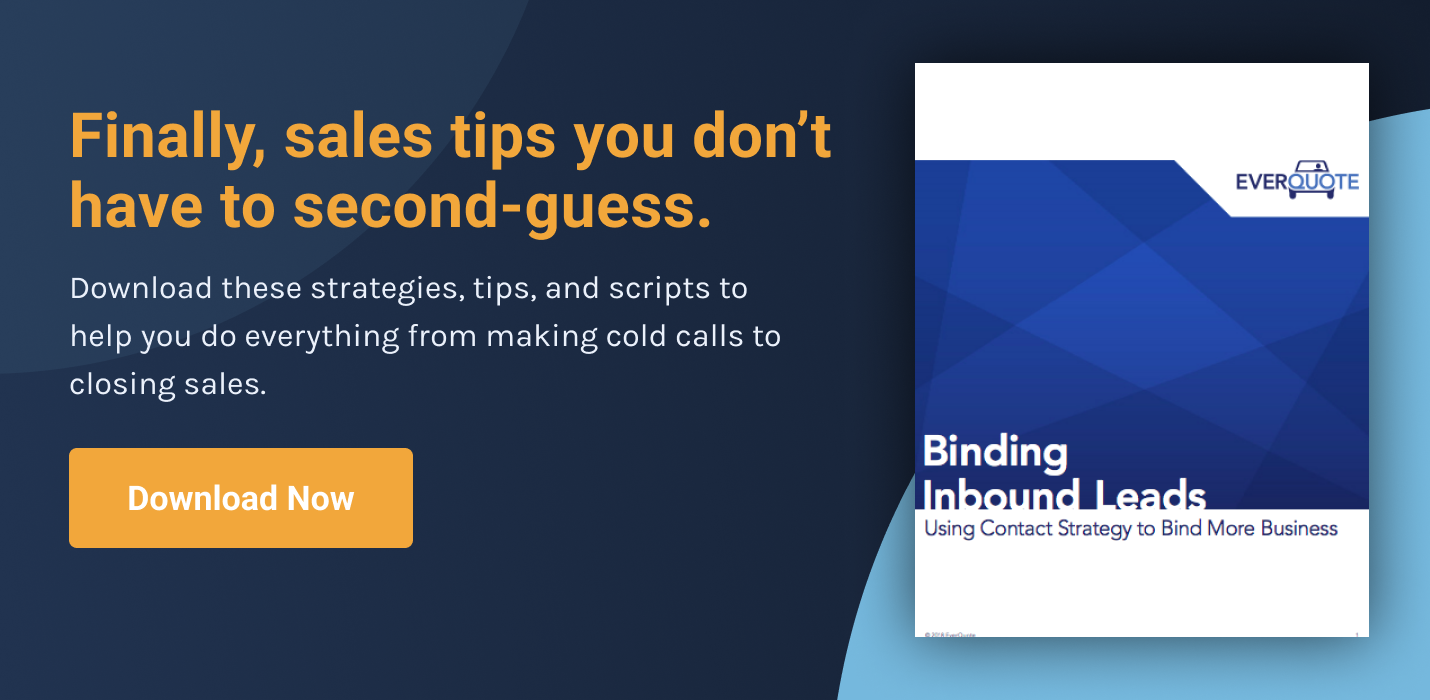- Home»
- EverQuote Pro Blog»
- 7 Insurance Sales Strategies That Will Actually Stop A Deal
7 Insurance Sales Strategies That Will Actually Stop A Deal

We’ve written several articles giving tips on what you as an insurance agent should be doing to make a sale—including tips on marketing ideas and growth strategies—but today, we’re looking at things from a different perspective: What do insurance agents do that prevent them from closing deals for their agencies? Pay attention—we’ve seen it happen, and if you’re doing any of these things, stop right now!
Insurance Sales Strategies That Actually Stop A Deal
Not taking time to understand your prospects.
One of the biggest barriers to an agency’s success is not understanding the prospects you’re bringing into your agency. If you don’t spend time learning what’s important to them, you’ll end up selling your insurance products based on features alone, and probably talking about things that don’t truly matter to your prospects. As a result, you won’t actually meet the needs of your potential client, which makes the chance of closing the deal very small.
What To Do InsteadAnswer these questions to learn about your prospects:
|
Using insurance industry jargon your prospects don’t understand.
Have you ever traveled to a foreign country and had a difficult time understanding the local language? This is how prospects feel when agents and producers talk to them using industry jargon.
Some producers love to use jargon, and that’s a problem. If your audience doesn’t know anything about the insurance world and just wants to save money, the worst thing you can do is talk about things like “bodily injury limits” and “exclusionary riders.” Why? Because when you use language your prospects don’t understand, you lose them.
What To Do InsteadOnce you understand your audience (see the previous step), you can use language that explains exactly what you’re offering in a way your customers understand. For example, instead of talking about "bodily injury limits," use plain language like "how much the policy would pay for injuries to anyone involved in an accident with your vehicle.” |
Not having a sales strategy for your agency.
Two major missteps an agent can make are not training his or her producers on the basics of selling and not arming them with the tools that allow them to sell. It’s terribly difficult to be effective when you don’t know what you’re doing or how to do it.
That said, don’t assume when you hire a producer that they already know how to sell. Even if they have a sales background, new hires need training and tools to do their jobs well.
What To Do Instead
|
Not having a proactive sales cadence.
One of the worst things an agent can do is spend a lot of money on marketing but forget to establish a clear-cut cadence for how and when to talk to prospects.
Inexperienced agents often have a single conversation, and when the prospect says they’re not interested, the lead is put on a shelf, effectively dead. This is a terrible way to handle a prospect and is virtually a guaranteed way to lose a deal.
This four-step cadence is proven to lead to more closed deals: Binding Inbound Leads: Using Contact Strategy To Bind More Business
What To Do InsteadGive your producers a cadence for when to call, email, send snail mail, text, etc. Data shows agents rarely close a deal on the first call, so be persistent. Use every method available to stay in front of prospects until they’re ready to buy. If you’re spending money on marketing and someone's responding, they have interest—maybe not on the exact day you call them, but interest nonetheless. Staying in the forefront of their mind is important, so you can be the first agency they seek out when they are ready to buy. |
You aren’t the first agent to talk to your prospect.
Not understanding the importance of “speed to lead” is a critical error for many agents. If you’re not the first to reach out to a prospect as soon as their information comes in, your competitor will be—and your chances of closing that customer drop significantly.
What To Do InsteadThe minute a prospect submits their info, reach out to them immediately. They are likely to be near a phone (they may have even submitted their info using their phone), so chances are, if you do, you can still capture them on or near their phone. But if you wait five minutes, they may have moved on. |
You don’t have the proper systems and tools to help you organize your business.
Because it often takes multiple touchpoints to close a deal with a prospect, you need an organized system of documenting every conversation your producers have with a potential customer. If producers can’t remember or don’t know the details of a previous conversation, your agency is at a major disadvantage, which can cause you to lose deals.
What To Do InsteadHave a clear-cut history of what you’ve discussed with prospects and how to follow up on your next call. If you already use an LMS or CRM (like Salesforce, Velocify, Zoho, etc.), you should fully implement the platform into your process so you can track contacts, quotes and binds. And by "implement" we mean getting every producer in the habit of documenting all interactions with their prospects. If you're not already using a platform, it's crucial that you put something in place. |
You focus on your agency more than your prospects.
When you spend too much time centered on your agency or yourself, you’re likely to lose a sale. Prospects want to know how you can help them solve their problems—not learn about what makes your agency great.
What To Do InsteadAlways focus on the prospect or customer. The best way to close a deal is to provide solutions to the prospect’s specific set of needs, so spend a lot of time listening, understanding prospects’ pain points, and learning why they’re looking for insurance today. Then, you can provide tailored solutions that will give you the best chances of closing the deal. |
Any insurance selling strategies you would add to this list?
If you’ve seen (or done!) any tactics you recognize as being counterproductive, leave a comment below, and we may feature your example in an upcoming article!
Unlock predictable growth with EverQuote.
Our representatives are standing by to help you succeed.
Call 844-707-8800
Weekdays, 9AM-5PM (ET)
Call 844-707-8800
Weekdays, 9AM-5PM (ET)
Accelerate your growth.
Complete the form below or just call 844-707-8800 to learn how we can help you achieve your goals.
By clicking "Get Started", I consent by electronic signature to being contacted by EverQuote, including by automatic telephone dialing and/or an artificial or prerecorded voice (including SMS and MMS - charges may apply), regarding EverQuote for Agents, even if my phone number is listed on a Do Not Call Registry. I also understand that my agreement to be contacted is not a condition of purchasing any goods or services, and that I may call (844) 707-8800 to speak with someone about EverQuote for Agents.
By clicking "Get Started", I affirm that I have read and agree to this website’s Privacy Policy and Terms of Use, including the arbitration provision and the E-SIGN Consent.
* Mandatory fields
 Product Overview
Product Overview Blog
Blog FAQs
FAQs Webinars
Webinars eBooks & Resources
eBooks & Resources